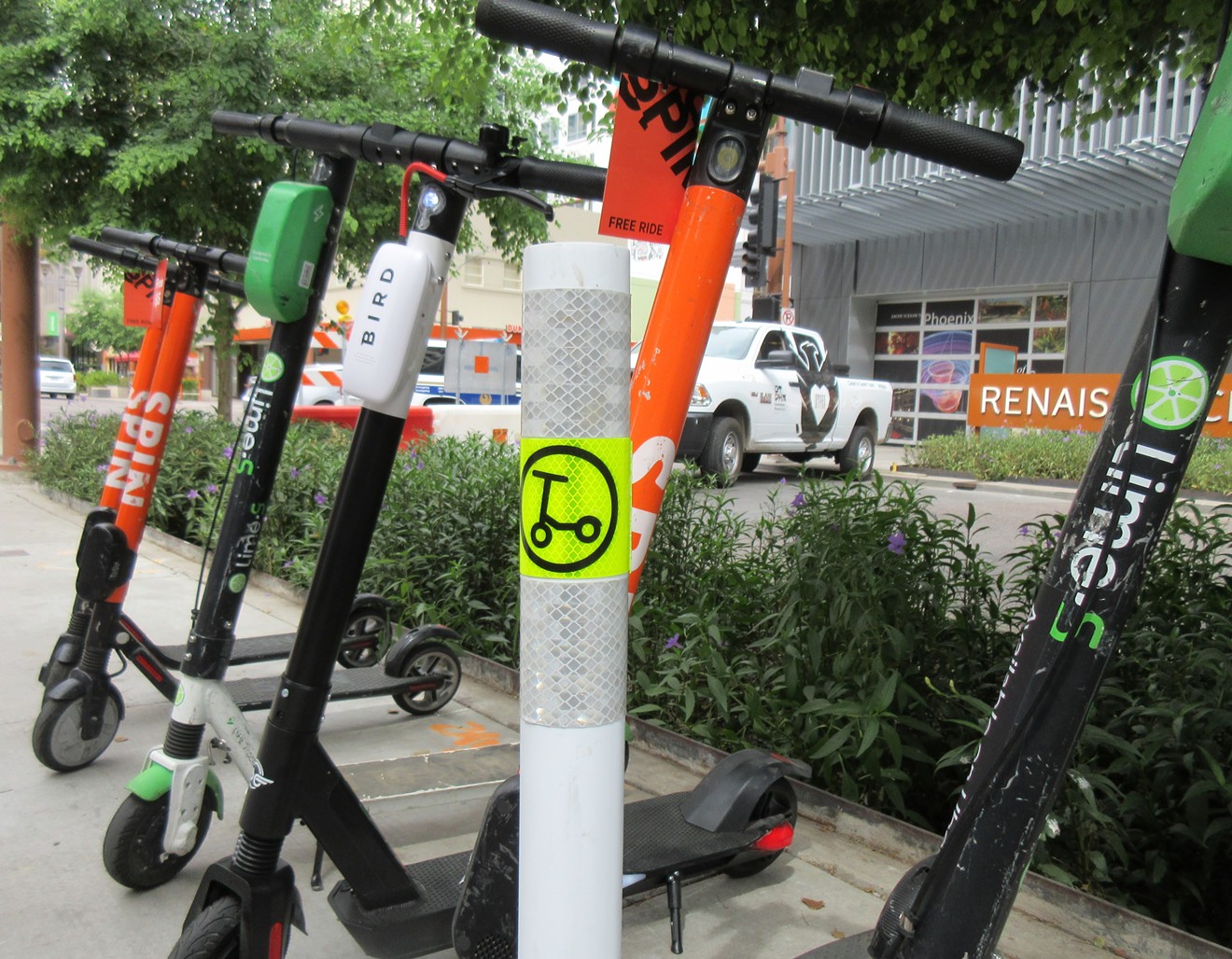Lime and Bird have temporarily pulled their e-scooters from downtown Phoenix after city officials warned them over their noncompliance with a parking rule.
The removals on Thursday evening came just four days after both companies launched in the downtown area and one day after Phoenix New Times reported their failure to follow the city's scooter requirements.
"We appreciate Phoenix for being forward thinking about micromobility and have been in close communication with the city while we make minor updates to our software to ensure we are creating a safe and responsible environment for riders and non-riders alike," a Lime spokesperson said in an email.
A spokesperson for Bird said the company has developed the necessary technology to follow Phoenix's rules, but not enough scooters are equipped with the software yet.
"We have successfully demonstrated to city officials the ability to comply with their parking rules, however our decision to pause comes as a result of the availability of vehicles in the area that meet the program's requirements. We plan to continue working closely with city and community leaders so we can return in the future,” the Bird spokesperson said.
Phoenix launched its six-month scooter pilot program on Monday, allowing three companies — Bird, Lime, and Spin — to deploy hundreds of L-shaped electric vehicles downtown.
All three scooter startups were required to comply with strict requirements to obtain permits, including a rule that they use so-called "geo-fencing" software to prevent riders from parking outside one of the city's 400 designated parking corrals. Under the rule, riders would not be able to end a pay-by-the-minute scooter session outside one of Phoenix's designated zones, giving them a financial disincentive from parking outside a corral.
A day after Phoenix launched its pilot program, New Times tested scooters from all three companies to check their compliance with the city's parking rules. Neither Lime nor Bird launched with the required software to preclude riders from parking outside Phoenix's scooter corrals, we found. Spin followed the rule.
Ashley Patton, a spokesperson for the Phoenix Street Transportation Department, was surprised on Tuesday to learn that Bird and Lime were breaking city rules. Shortly after New Times published its story, city officials sent notices to Lime and Bird requiring them to comply with the parking rule by the end of Friday, September 20. Failure to comply by deadline would result in the revocation of their scooter permits.
Instead, both companies voluntarily pulled their scooter fleets from downtown as they figure out updates to their software to meet the parking requirements. Lime removed 150 scooters from the streets on Thursday evening. It's unclear how many scooters Bird had deployed.
The scooter hiccup in Phoenix highlights the challenges faced by cities facing a largely unregulated, shareable transportation system. Cities with scooter programs have dealt with sidewalk clutter, rider injuries, and disputes with companies prone to breaking regulations.
Other cities have implemented regulations to promote rider safety and prevent sidewalk clutter, including parking requirements, but people familiar with scooter regulations said Phoenix's rank among the strictest in the United States. A spokesperson for Lime said Phoenix is the first city to require companies to preclude riders from parking outside designated zones.
9/24/2019, 10:04 a.m: This story has been updated with comment from Bird.
[
{
"name": "Air - MediumRectangle - Inline Content - Mobile Display Size",
"component": "18478561",
"insertPoint": "2",
"requiredCountToDisplay": "2"
},{
"name": "Editor Picks",
"component": "16759093",
"insertPoint": "4",
"requiredCountToDisplay": "1"
},{
"name": "Inline Links",
"component": "17980324",
"insertPoint": "8th",
"startingPoint": 8,
"requiredCountToDisplay": "7",
"maxInsertions": 25
},{
"name": "Air - MediumRectangle - Combo - Inline Content",
"component": "16759092",
"insertPoint": "8th",
"startingPoint": 8,
"requiredCountToDisplay": "7",
"maxInsertions": 25
},{
"name": "Inline Links",
"component": "17980324",
"insertPoint": "8th",
"startingPoint": 12,
"requiredCountToDisplay": "11",
"maxInsertions": 24
},{
"name": "Air - Leaderboard Tower - Combo - Inline Content",
"component": "16759094",
"insertPoint": "8th",
"startingPoint": 12,
"requiredCountToDisplay": "11",
"maxInsertions": 24
}
]











